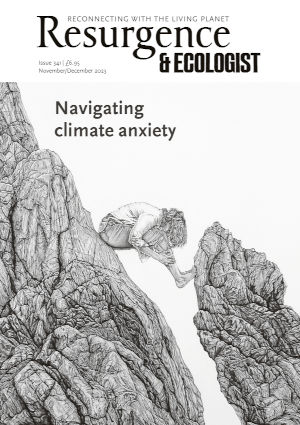In the closing essay of this remarkable anthology, Thelma Young Lutunatabua recalls the 2005 manifesto written by Grace Lee Boggs and other women leaders, in which, she writes, they assert: “Another world is necessary, another world is possible, another world has already started.” Not Too Late powerfully evidences and invokes that promise, striking just the right balance between what Rebecca Solnit, Lutunatabua’s co-editor, refers to as “danger” and “possibility”.
The book doesn’t shirk the stark truth of climate danger. Contributor Joëlle Gergis, a climate scientist and lead author of the IPCC’s Sixth Assessment Report – the one that warns it’s now or never – is uncompromising: we are living through a decade that will determine the fate of humanity. My eyes prickle with emotion at her story of a chance encounter in rural Australia with a weather-beaten man who admits to never believing in the climate crisis. Red-eyed, voice wavering, he offers an apology for having taken so long to understand what’s happening. “It’s all right. You are here now. It’s not too late,” she reassures him.
And therein lies the possibility, the potential for active, radical hope. By opening our eyes to all the others who are also here now – and all those still to come – Not Too Late is a manual for how to confront and survive the new climate reality.
Reading it, as I do, with a backdrop of the hottest June on record, of homeless people in Phoenix, Arizona being admitted to hospital with third-degree burns, of torrential rain, landslides and floods in South Korea, one of the central questions at the heart of the book couldn’t feel any more pertinent. What is the best each of us can do?
Tell stories, connect, work with compassion, find your power, hear and amplify the voices that have been disappeared – none of these feels particularly new, though they need saying, on repeat. What does feel different is the focus on, well, feelings. Because this book is an exhortation to truly feel in response to the climate crisis. To not shy away from the kind of grief experienced by the islanders of Guam when super typhoon Paka unearthed and dispersed the buried bodies of loved ones. To embrace the fear of losing our stable ecosystems and step through what Roshi Joan Halifax’s essay describes as a doorway to the opportunity to strengthen and resource ourselves. To confront the things that might be difficult, whether that’s the decolonising climate work addressed by global south scholar Farhana Sultana, or overcoming the ways in which we have learnt to be individualistic rather than collaborative. And most of all, to feel joy at the small imperfect wins, the changes that are difficult to measure but really matter; to celebrate the acts of the “countless anonymous heroes” who are here now.
Not Too Late is empowering, a reminder that we have choices. To listen to those already living in balance with the Earth, to learn from our grandparents and our children. To choose what climate justice writer Mary Annaïse Heglar calls a “climate commitment” – one marked by practice, not perfection, letting go of the saviour complex and finding our place in collective action. This recurring idea is conveyed especially vividly by Solnit when recounting local people’s response to Hurricane Katrina. She writes of them taking boats to rescue survivors who had been abandoned by the authorities: “No one thought they could save everyone; everyone thought it was worth trying to save someone.”
The words from that 2005 manifesto bring to mind those of Arundhati Roy: “Another world is not only possible, she is on her way. On a quiet day, I can hear her breathing.” This book brings her into being. It’s definitely not too late.
Not Too Late: Changing the Climate Story from Despair to Possibility by Edited by Rebecca Solnit & Thelma Young Lutunatabua. Haymarket Books, 2023. ISBN: 9781642598971.






